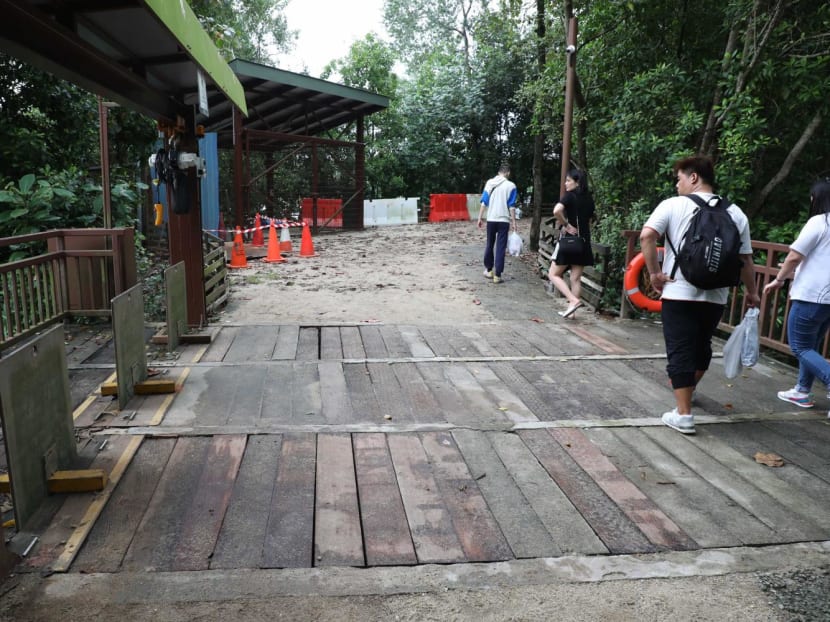Explainer: What recourse does someone have after getting injured due to external elements at a public park?
SINGAPORE – The incident earlier this week where a man and his daughter fell into a hole in a bridge at Sungei Buloh Wetland Reserve has raised the question of what legal recourse parkgoers can seek should they find themselves injured due to external elements.

Planks of a crossing at Sungei Buloh Wetland Reserve where two people fell during a downpour have been replaced, as seen on Jan 26, 2023.
- The incident of a father and daughter falling into a hole in a bridge at Sungei Buloh has raised the question of what legal recourse one can take in such situations
- TODAY spoke to four lawyers to find out what park-goers can seek compensation for should one find himself injured at the park
- Lawyers said various factors have to be considered by those who wish to seek legal recourse
SINGAPORE – The incident earlier this week where a man and his daughter fell into a hole in a bridge at Sungei Buloh Wetland Reserve has raised the question of what legal recourse parkgoers can seek should they find themselves injured due to external elements.
Such accidents include trees collapsing, landslides and attacks by wild animals.
Lawyers TODAY spoke to said that in most cases, the National Parks Board (NParks) would typically be the party held liable for incidents involving injuries at public parks and nature reserves.
As the authority overseeing the park, NParks has a "duty to care" to park-goers, which means it has to ensure that no harm befalls visitors when they visit the park, the lawyers said.
However, there are various factors that need to be considered if one wishes to seek legal recourse.
Mr Bucky Hussain, the man involved in the Sungei Buloh incident on Monday (Jan 23), told TODAY that as someone who enjoys nature, he does not intend to seek compensation from NParks for his injuries or losses.
“There’s no way they could’ve known about the hole, and they took steps to rectify (the issue) as soon as possible,” he said.
The former ecologist said that he had sustained “pretty painful bruises” on his ribs and right thigh, and cuts on his arm when he and his two-year-old daughter fell through the hole.
The 33-year-old also lost his Rayban sunglasses, his camera was spoilt and his “favourite shorts” were torn.
Lawyer Amarick Gill, director of Amarick Gill LLC, said that anyone in such situations who wish to pursue legal recourse would have to first establish liability.
“There are a myriad of factors, like what’s the maintenance record of the bridge? What have the authorities done to ensure safety?” he added.
“In this case, they would have to prove negligence on the part of authorities maintaining the facility.”
WHEN CAN ONE SEEK LEGAL RECOURSE?
Veteran lawyer Amolat Singh of Amolat & Partners said that the law requires the park authority or operator to take “reasonable steps in preventing the reasonably foreseeable danger and not Herculean steps to eradicate every form of danger”.
For example, if a tree falls on a person because of poor maintenance and a lack of inspections, then NParks could be held liable for injuries sustained, as it is the authority's responsibility to ensure the park is safe.
But in cases where the tree collapse is caused by an "act of god" incident such as a lightning strike, NParks would not be held liable since such accidents are not reasonably preventable.
“At the same time, the victim’s conduct is also scrutinised. The victim must also take reasonable steps to safeguard his own safety,” Mr Singh said.
He added that it is the visitor’s responsibility to look out for dangers and avoid them.
Mr Pratap Kishan, director of Kishan Law Chambers LLC, echoed the sentiment, saying: “For example, if there’s a lightning risk warning or alert, don’t go walking under trees at the park.
“Because if a tree gets struck by lightning and collapses on you, it is your fault for choosing to take the risk despite the warnings issued,” he said.
Ms Christine Low, director of Peter Low Chambers LLC, said that the park authorities are also not likely to be held liable for landslides if the cause was not foreseeable and they had conducted regular safety checks and not identified any hazards before the incident.
On the other hand, attacks by wild animals such as wild boars leave park operators more open to legal recourse.
Mr Kishan said that park operators have a responsibility to ensure that no harm comes to visitors who follow the rules of the park.
This means they have to make sure that wild animals roaming around pose no risk to visitors.
Should a wild animal attack a park-goer, it would then be NPark’s fault for having such a risk present on its premises. ADDITIONAL REPORTING BY SAMUEL NG









